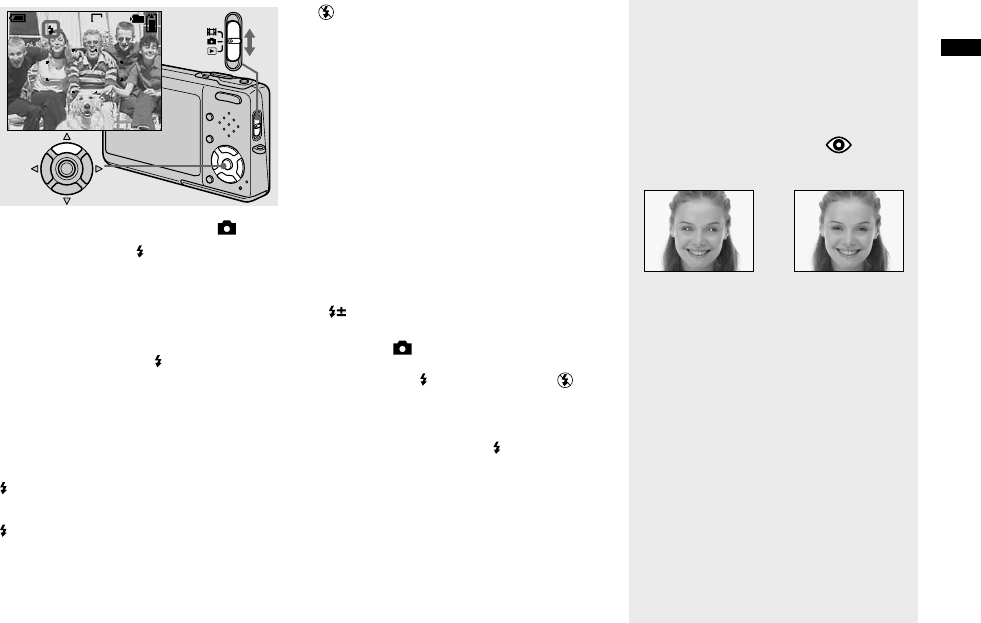
37
DSC-T3/T33 2-548-269-11(1) [OpenType FONT]
Shooting still images
Selecting a flash mode
60min
VGA
101
96
SAF
Set the mode switch to ,
and press ( ) on the control
button repeatedly to select a
flash mode.
The selected flash mode indicator appears
enlarged on the LCD screen (page 124).
Each time you press ( ), the indicator
changes as follows.
No indicator (Auto): The flash
automatically strobes when shooting
images in a dark place. The factory setting
is Auto.
(Forced flash): The flash strobes
regardless of the surrounding brightness.
SL
(Slow synchro): The flash strobes
regardless of the surrounding brightness.
The shutter speed is slow in a dark place,
so you can clearly shoot the background
that is out of flash light.
(No flash): The flash does not strobe.
• If the menu is currently displayed, press
MENU first so that the menu disappears.
• The recommended shooting distance using
the flash is approx. 0.1 m to 1.7 m (4 inches
to 5 feet 6 7/8 inches) (W)/0.5 m to 1.6 m
(1 foot 7 3/4 inches to 5 feet 2 7/8 inches) (T)
(DSC-T3), approx. 0.1 m to 1.6 m (4 inches to
5 feet 2 7/8 inches) (W)/0.5 m to 1.5 m (1 foot
7 3/4 inches to 4 feet 11 inches) (T) (DSC-
T33) (When [ISO] is set to [Auto] in the menu
settings).
• The flash strobes twice. The first time is the
pre-flash which is used to adjust the flash light
quantity, and the second time is the actual flash
during which the image is recorded.
• You can change the brightness of the flash with
(Flash Level) in the menu settings (page
66). (You cannot change the brightness of the
flash while (Camera) in the menu is set to
[Auto] in the menu.)
• When using the
SL
(Slow synchro) or
(No flash) mode, the shutter speed becomes
slower in dark places, so using a tripod is
recommended.
• While charging the flash, the /CHG lamp
flashes. After the charging is complete, the
lamp goes out and flash mode is ready.
• Flash mode setting is maintained even when
the power is turned off.
To prevent subjects’ eyes from
appearing red
The flash pre-strobes twice or more
before shooting to reduce the red-eye
phenomenon.
Set [Red Eye Reduction] to [On] on the
Setup screen (page 124). The indicator
appears on the LCD screen.
Red-eye reduction takes approximately one
second before actually shooting the image,
so hold the camera firmly to avoid shaking.
In addition, be sure to tell the subject to
hold still.
• Red-eye reduction may not produce the desired
effects depending on individual differences,
the distance to the subject, if the subject does
not see the pre-strobe, or other conditions. In
addition, red-eye reduction is more effective
under bright lighting and when closer to the
subject.


















